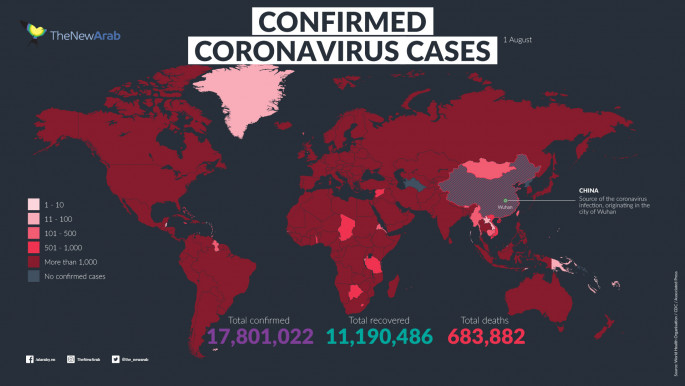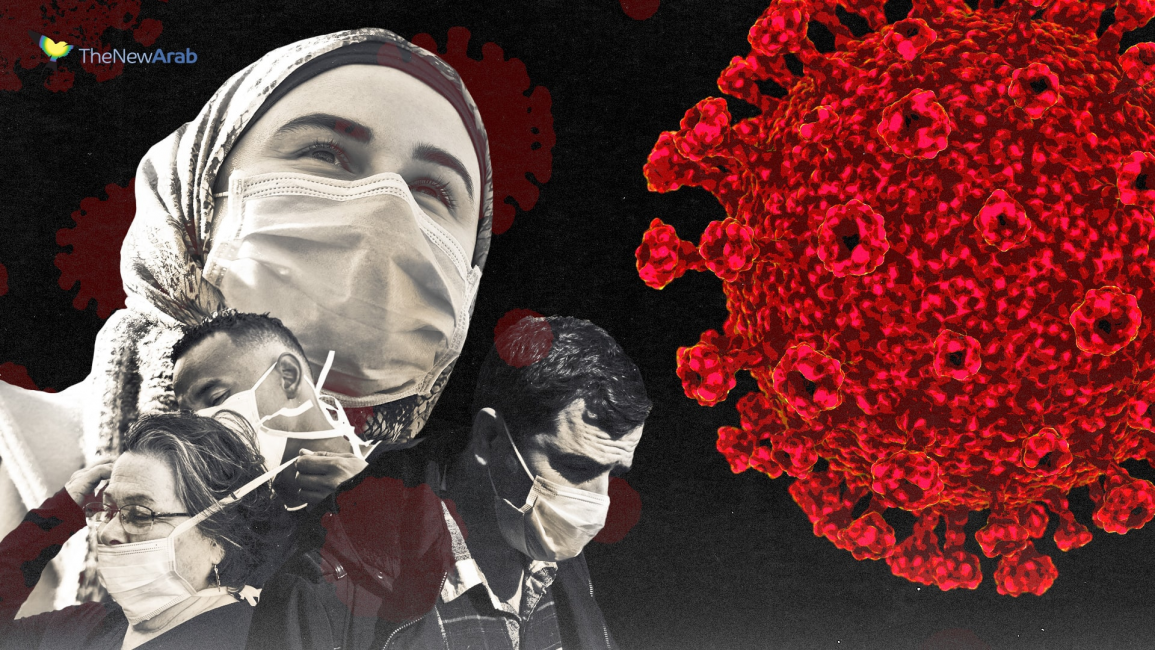The Middle East at war with coronavirus: Top stories from 2 June
1. First Rohingya refugee dies from coronavirus in Bangladesh
A 71-year-old man has become the first Rohingya living in vast refugee camps in Bangladesh to die from the coronavirus, an official said Tuesday.
Health experts have long warned that the deadly virus could race through the vast network of settlements housing almost a million refugees in the country's southeast.
"He died on May 31. But last night we got the confirmation that he died of Covid-19," said Toha Bhuiyan, a senior health official in the Cox's Bazar district.
The fatality was in Kutupalong, the largest of the camps, which is home to roughly 600,000 people.
The man was among at least 29 Rohingya to have tested positive for the virus in the camps.
Bhuiyan said the victim died in an isolation centre run by the medical charity Doctors Without Borders and was buried in the camp the same day.
The Cox's Bazaar district - home to 3.4 million people including the refugee population - was placed under total lockdown after a number of infections were recorded in April.
Bangladesh has also seen a sharp rise in coronavirus infections in recent weeks, with more than 60,000 cases and around 700 deaths.
Read more here.
2. UAE's Sharjah raises $550 million to boost coronavirus-hit economy
 |
|
| Click to enlarge |
The third most populous emirate in the UAE, Sharjah has been hit hard by low oil prices and lockdown measures introduced to stop the spread of the novel coronavirus.
The 2 billion UAE dirham sukuk loan issuance by the local government will be used to "support the Sharjah economy" and has been managed by Sharjah Central Bank.
"The securities were issued under the Sharjah Liquidity Support Mechanism, a framework initiated by the government to enhance liquidity for the Sharjah banking system, and in co-operation with the Targeted Economic Support Scheme (Tess) of the Central Bank of the UAE," a statement read according to local media.
The issuance would likely be between $750 million and $1 billion, Reuters said on Tuesday.
S&P Global Ratings recently lowered Sharjah's credit rating to a "negative" rating, after recent economic disruptions.
Read more here.
3. Saudi Arabia intensifies bombardment on coronavirus-hit Yemen as it prepares to co-host aid conference
The Saudi-led coalition intensified its bombing campaign in Yemen on the eve of a Tuesday donor conference co-hosted by Riyadh to help the impoverished country tackle the coronavirus pandemic.
 |
|
| Click to enlarge |
The coalition launched dozens of strikes on Monday in Marib and Asir provinces, but no casualties were reported.
The attacks launched by the Saudi-UAE coalition aircrafts came on the eve of an emergency donor conference, co-hosted by Riyadh and the United Nations, to support the war-torn country as it faces a coronavirus catastrophe in the sixth year of the Saudi-led military intervention.
The virtual conference seeks to raise $2.3 billion to support Yemen, where aid groups have warned that the fast-spreading virus could wreak havoc after years of war and amid crippling funding shortages.
"A total of $2.3 billion is being sought to cover emergency requirements in Yemen across multiple humanitarian sectors, including medical, food and shelter assistance," a Saudi government statement said.
Saudi Arabia, which leads a military intervention against Iran-aligned Houthi rebels, counts itself as a top donor to Yemen, having contributed billions of dollars in aid.
But the Saudi-led coalition is also widely blamed for civilian casualties in bombing raids that campaigners say have pushed the country deeper into crisis.
A rebel spokesman dismissed the Saudi-led conference as a "silly attempt to (gloss over) their crimes", according to the Al-Masirah television.
Read more here.
4. Masks and no ablution: Saudis flock to reopened mosques
Mask-clad worshippers flocked to Saudi mosques that re-opened nationwide Sunday - except in the holy city of Mecca - over two months after congregational prayers were halted under a coronavirus-triggered lockdown.
Twitter Post
|
Complying with stringent social distancing rules, worshippers kept a minimum of two metres apart.
They had been instructed to bring their own prayer mats and to perform the cleansing ritual, or ablution, at home, instead of in mosque grounds.
"Worshippers rushed to the home of God to perform their obligatory duty (prayers) after the reopening of mosques," the ministry of Islamic affairs said on Twitter.
The ministry posted a video showing a mosque with many worshippers wearing face masks and reaching out for a large bottle of hand sanitiser after prayers.
Authorities have instructed mosques to avoid crowding and the distribution of food, drinks, incense and miswak twigs used to clean teeth, according to the ministry.
But some complained that worshippers were not strictly complying with the rules.
"I prayed, praise be to God, in the neighbourhood mosque... and it was a beautiful feeling," said one Twitter user.
"But I swear to God that some people do not care about anything. No face mask. No rug."
Saudi Arabia, home to Islam's holiest sites, had shut down mosques nationwide for more than two months to limit the spread of the Covid-19 respiratory disease.
The kingdom will lift the lockdown entirely from 21 June, Mecca aside.
Read more here.
5. Amid conflict and coronavirus, Yemen becomes one of the world's busiest migration routes
The journey to Yemen across the Red Sea from the Horn of Africa has become the world's busiest maritime migration route, the UN's migration agency has said, with more than 100,000 migrants last year risking their lives to reach the oil-rich Gulf states.
Migrants who crossed over to Yemen from the African continent now face a triple threat of conflict, humanitarian catastrophe and the novel coronavirus, The Guardian reported.
Many of the mostly Ethiopian and Somalia migrants in Yemen did not know about the country's conflict before making their way across the Red Sea. Most are also unaware of the risk of torture and rape they face at the hands of traffickers.
Aid agencies are now worried that the country's little-reported migrant population will be even more vulnerable amid the coronavirus pandemic.
The UN fears the Covid-19 disease has spread unchecked throughout the war-torn nation, where authorities have been accused of covering up the true toll of deaths and infections amid reports of Yemenis dying with coronavirus-like symptoms.
The conflict has shut down or destroyed half of Yemen's health facilities, leaving medics ill-equipped to combat the virus.
"As well as Yemenis displaced by the conflict, we are also trying to help migrants who have no money, no support networks, nothing when they get here," Jean Nicholas Beuze, the UN refugee agency's representative to Yemen, told The Guardian.
Read more here.
Follow us on Facebook, Twitter and Instagram to stay connected


![Afghanistan floods [AFP] Afghanistan floods [AFP]](/sites/default/files/styles/image_330x185/public/media/images/0C0EC6AD-9E62-4D73-9148-11B37ECD5C46.jpg?h=d1cb525d&itok=2Qgw9O8Y)
